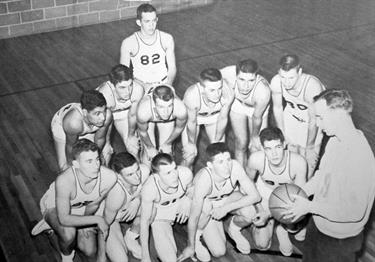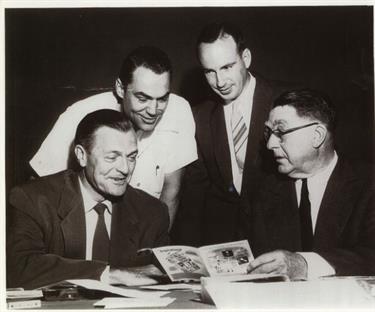This story appears in FCA Magazine’s May/June 2016 issue. Subscribe today!
Don McClanen simply answered God’s calling upon his life.
Answering each of those calls took a huge step of faith for McClanen, and each brought incredible challenges and personal sacrifice. Some of those steps were even taken amid intense, personal heartache. But through each step taken, each hardship endured, the faith and trust McClanen placed in his Savior was galvanized and strengthened even more.
Honoring the life and faith of Don McClanen, FCA Magazine takes a look back at the God-directed path he followed to bring the Fellowship of Christian Athletes to life.
* * *
Born Feb. 3, 1925, in Trenton, N.J., Don McClanen came from humble beginnings as the son of a carpenter. A young athlete with dreams of one day being a coach, he joined the U.S. Navy and served in the Pacific in World War II.
After his service concluded, McClanen and his wife, Gloria, headed for Oklahoma A&M (now Oklahoma State University) in Stillwater. McClanen considered the school to be a great place to major in physical education so he could become a coach, and three years as a manager for legendary basketball coach Henry Iba gave him great training for his chosen career.
McClanen’s youth pastor asked him to consider how he would merge his faith with his desired profession. The thought puzzled McClanen for some time, and it wasn’t until he attended a physical education conference in Oklahoma City that the pieces fit together. One of the speakers challenged the coaches to recognize how their own lives and examples could lead young people either “up a mountain or down a drain.”
McClanen felt like he was failing to model the Christian life. He took a walk to sort his thoughts, and an open door to a church beckoned him inside. There, in the house of God, he prayed, “Lord, I surrender my will to You.”
Years later, McClanen would come to understand this prayer took him, for the first time, from belief to obedience.
* * *
After graduating, McClanen started his coaching career at a high school near Stillwater, but soon took a position as basketball coach and athletic director at Eastern Oklahoma A&M (now Eastern Oklahoma State).
McClanen began collecting newspaper and magazine articles about Christian athletes and coaches. He was fascinated by them. After reading that 30 million American youth had no religious training at all, McClanen began posting the articles in his team’s locker room and holding team prayers before games. Soon, he was dreaming of a time when well-known Christian athletes would advertise their faith the way they advertised other household products.

Don McClanen (with basketball) served as head basketball coach and athletic director at Eastern Oklahoma A&M in the 1950s while he took the initial steps to found FCA.
One night in 1954, McClanen shared his vision with Dr. Louis Evans, a visiting pastor and former basketball player at Occidental College who had been named one of America’s top 10 clergymen by LIFE magazine.
“If athletes can endorse shaving cream, razor blades and cigarettes,” McClanen told Evans, “surely they can endorse the Lord.”
McClanen showed Evans his collection of clippings, and Evans was amazed to discover how many major athletes of the day were Christians. He suggested McClanen write to those athletes and ask if they would be willing to become public witnesses for Christ. In all, 19 letters were mailed, each carefully laying out McClanen’s God-given desire for “some type of organization that would provide an opportunity for those of us who are so inclined to speak and witness for Christ and the wholesome principles of good character and clean living to the youth of our nation.”
McClanen was thrilled to receive positive responses from most of the 19 athletes, even though, as he said, they didn’t know him “from a bar of soap.”
One of the men who did not respond was Branch Rickey, the Pittsburgh Pirates general manager notorious for knocking down the game’s color barrier by signing Jackie Robinson while with the Brooklyn Dodgers.
McClanen tried and tried to get a meeting with Rickey. Finally, while on a family trip to the east coast, he was told he could drive to Pittsburgh for the possibility of five minutes with Rickey.
On an August day in 1954, he got his five-minute meeting with Rickey. It lasted five hours.
During those five hours Rickey, who knew and respected Evans’ ministry, was enthralled by what McClanen shared.
 “Finally, he made a statement that I’ll never forget,” McClanen said in Sharing the Victory, Fifty Years – One Mission. “‘This thing has the potential of changing the youth scene of America within a decade. It is pregnant with potential. It is just ingenious. It’s a new thing; where has it been?’”
“Finally, he made a statement that I’ll never forget,” McClanen said in Sharing the Victory, Fifty Years – One Mission. “‘This thing has the potential of changing the youth scene of America within a decade. It is pregnant with potential. It is just ingenious. It’s a new thing; where has it been?’”
Rickey got McClanen in touch with leaders in the sports world and with Paul Benedum, a Pittsburgh businessman, who less than a year later put the organization on stable ground with a $10,000 donation.
In September 1954, McClanen’s yet-unnamed organization had its first advisory board meeting in Oklahoma City. With a firm resolve to emphasize “Christian” rather than merely “religious” athletes, the Fellowship of Christian Athletes was born. Then, on Nov. 10, 1954, three months after McClanen’s meeting with Rickey, FCA was chartered in Oklahoma.
* * *
While enthusiasm was high, funding for the new ministry was slower to come.
McClanen arranged for several well-known Christian athletes to come to Oklahoma City and Tulsa to speak at high school assemblies and college campuses. In his book Impact For Christ, author Wayne Atcheson called those events “the real kickoff for FCA.”
McClanen continued to coach, teach and serve as athletic director at Eastern Oklahoma A&M—all while trying to keep FCA afloat. At any time finances could dry up, and Gloria was praying FCA wouldn’t lead their family to bankruptcy.

McClanen (second from right) was aided in his FCA efforts by influential Christian leaders of the time: Dr. Louis H. Evans, Dr. Roe Johnston and Branch Rickey.
In early 1956, major citywide events—similar to those in Oklahoma City and Tulsa the previous year—were scheduled for Denver, Houston and Indianapolis. Ninety-thousand young people heard the gospel from some of the nation’s most popular athletes and coaches. The Denver events were even covered by Sports Illustrated, giving FCA a much-needed publicity push.
That year turned out to be a big one, with Estes Park, Colo., hosting the first FCA National Conference, a precursor to today’s FCA Camps.
In the years that followed, FCA continued to experience the highs and lows of a fledgling ministry just finding its footing. McClanen stepped away from FCA in 1961, but his legacy continues to be felt as the sports ministry he was so deeply inspired to begin impacts more than 2 million lives for Christ every year.
* * *
Whether it was the founding of FCA or other influential ministries, including an inner-city youth ministry “Washington LIFT” in Washington, D.C., a church renewal ministry, and the “Ministry of Money” to help people follow Christ in their financial lives, Don McClanen passionately answered each of God’s callings upon his life. In doing so, he was simply honoring another Son of a carpenter who came from humble beginnings.
McClanen passed away on Feb. 16, 2016. He was preceded in death by two of his children: a son, Douglas, in 1947, who died one day after birth, and a 10-year-old daughter, Judy, who died in 1960. He and Gloria lived in Germantown, Md., for more than a half-century. At the time of his passing they had two adult children, son Michael (and his wife, Amra) and daughter Laurie, along with seven grandchildren and 11 great-grandchildren.
***
Memories of McClanen
“If there is ever a question about what God can do with a life totally surrendered, called and risking all to follow His vision, we can point to a young basketball coach from Oklahoma, who in 1954 saw the potential of athletes and coaches to share the gospel with the world. Years later, that vision is alive and well through FCA, influencing lives for Christ across the globe—an amazing legacy. We praise God for the life of Don McClanen. His unwavering commitment and vision truly enabled FCA to grow to where it is today, encouraging millions of coaches and athletes to lead lives dedicated to Christ.”
– Les Steckel
FCA President/CEO
“God put a fire in Don McClanen’s heart to reach the world for Christ. He was a humble man who had a lot of passion. That's a unique combination. Being around him, I was always challenged to dream big and see what God could do through a simple man. A man with a vision in his eyes can change the world, and that was Don McClanen.”
– Dan Britton
Executive Vice President
FCA International
“FCA lost a hero of the faith, a great visionary and a beloved friend. I had the unique opportunity over the last several years to get to know Don McClanen and his wife, Gloria, in a very personal way. They frequently attended FCA events in Maryland and were humbled to see the growth and impact of the ministry. I witnessed their great faith, love and perseverance. They inspired me to reach athletes and coaches and all whom they influence with the gospel of Jesus Christ.”
– Jimmy Page
Vice President of Field Ministry
FCA Mid-Atlantic Region
***
More McClanen Memories:
For more on FCA Founder Don McClanen, including past articles, photos, videos, audio recordings, and information on his biography, Caution to the Wind by Joe Murchison, visit www.fca.org/don.
-FCA-
Photos courtesy of Amy Richards and Eastern Oklahoma State University